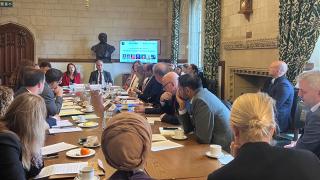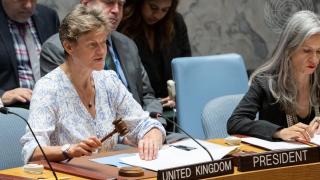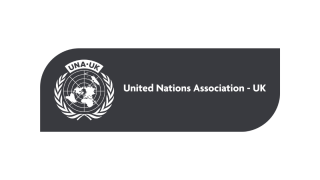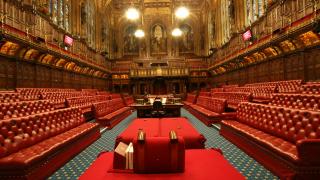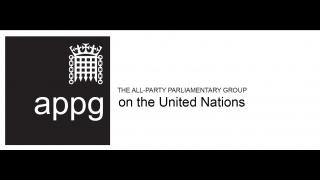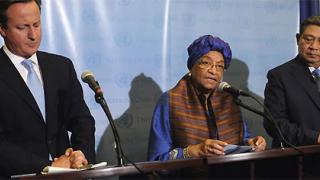
On 22 November, Lord Hannay of Chiswick, Chair of the UN All-Party Parliamentary Group, took part in a parliamentary debate on the UN Millennium Development Goals and the shape of the international development agenda after 2015 - the target date for achieving the Goals.
The UK has a key role to play in shaping the post-2015 development agenda through Prime Minister David Cameron's position as co-chair of the UN Secretary-General's high-level panel on this issue. The panel's first meetings concluded in London earlier this month, with a promise to work together to fight poverty and a clear aim: to end extreme poverty within a lifetime.
In Parliament, Lord Hannay pointed to the relative successes of the current MDG framework and called for a new set of goals, refined to take into account the lessons of the past decade and focussed on the 'bottom billion' - the poorest and most vulnerable people, who are found in middle-income as well as low-income countries.
He called on the UK to publish its position on the post-2015 development agenda, possibly through a White or Green Paper, as soon as possible.
The full text of Lord Hannay's statement is reproduced below.
Click here to read the whole debate
Lord Hannay of Chiswick: My Lords, when the Millennium Development Goals were first promulgated at the millennium summit in 2000, it was easy and tempting to dismiss them as just another piece of UN flannel; more warm words designed to conceal a lack of action. It was easy and tempting, but quite wrong. In fact, the goals have proved to be a lot more effective than all the volumes of exhortations which preceded them in earlier years; also because they committed the Governments of developing countries-as well as those of donor countries-to implementing them. This provided that platform of equal and mutual commitment which was so often lacking in the past and which surely must be a clear part of any post-2015 system.
Of course, not everything has gone right with the development goals. Many donor countries have fallen short on their commitments and allowed their aid budgets to be squeezed by austerity. Many developing countries, particularly those in conflict zones, have made little, if any, progress towards achieving them; and the broad-brush approach used in 2000 has meant that the major achievements of a few populous countries in Asia in lifting tens of millions of their citizens out of poverty have masked the failures elsewhere. That is why the worst possible course of action would be simply to roll over the 2000 system and targets and then forget about them. We need to learn and apply the lessons of those first 15 years and that is the reason why I thank the noble Baroness, Lady Nicholson, for initiating this debate and introducing it so well.
Here are a few thoughts for the future. First, any post-2015 system should focus much more specifically on what Professor Collier-already mentioned several times in this debate-has eloquently called "the bottom billion". It is the plight of those people, wherever they may be found-and we should be wary of the sweeping classification of countries as poor or middle income-which needs to be addressed far more effectively than before. We should not turn our backs on the Dalits in India or on the street children of many Latin American countries. Secondly, we surely need far more rigorous systems for benchmarking progress-or the lack of it-in both donor and recipient countries and for naming and shaming countries on both sides of that divide who fall short of their commitments.
Thirdly, we need to bring the private sector, both business and the great philanthropic foundations, into the heart of devising and implementing the post-2015 MDGs. Too often they have been treated as add-ons and their contributions have not always fitted as well as they should with national Governments and the great intergovernmental institutions. This time, we need to do better than that and we should not forget what a crucial role business has to play in the fight against corruption, in particular through such schemes as the extractive industries transparency initiative. In that context, when the Minister replies to the debate will he report on the progress of negotiations within the European Union to make the EITI a mandatory requirement for European businesses?
Fourthly, we need to focus more effectively on the gender aspects of the post-2015 MDGs. It is not enough to have a single gender policy goal, or set of goals, because gender issues crop up in every one of the goals. Nor is it enough to say simply that gender issues are cross-cutting and then ignore and neglect them in their application. Somehow we need to resolve that paradox. I therefore hope that before too long, the Government will come forward with their thinking on the post-2015 MDGs in the form, perhaps, of a White or a Green Paper or a discussion document. We need to move the national debate on aid on to more positive and forward-looking territory and away from the well-trampled terrain of the ring-fencing of our aid budget.

